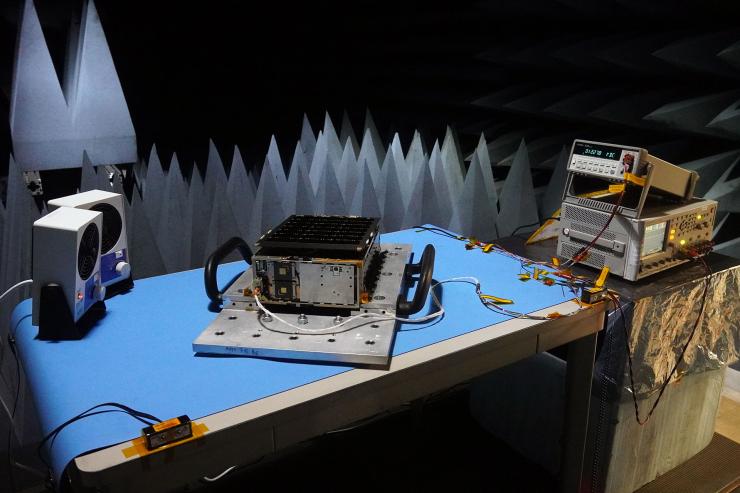On Sept. 5, the new Georgia Tech Space Research Institute (SRI) held its inaugural meeting with over 130 researchers from across the campus at the Marcus Nanotechnology building. The event marked a new moment for the Institute, which began operations on July 1, and is yet another sign of Tech’s commitment to becoming a leader in ground-breaking research.
The highlights of the meeting were as follows: the CubeSats satellites launched into Earth’s low orbit by the Space Systems Design Lab in March; physics Ph.D. student J. Cole Faggert received a NASA Future Investigators in NASA Earth and Space Science and Technology (FINESST) award for using multi-wavelength imaging to study supermassive black holes in August; and in September, math Ph.D. and aerospace engineering master’s student Jaden Wang received the NASA Space Technology Graduate Research Opportunity (NSTGRO) grant to support his research on computing mathematically-based solutions for landing spacecraft.
The Center for Space Technology and Research (CSTAR) was a hub that expanded Tech’s aerospace industry research. The Hypersonic Center of Excellence, Georgia Tech Astrobiology, Center for Relativistic Astrophysics and Space Policy and International Relations Center are all groups under CSTAR that now also function under the SRI. Across various colleges, there are students, faculty and other professionals who conduct space research, and the SRI serves as a central support hub for CSTAR centers, labs and individuals.
“Establishing this really took shape probably 15 years ago or so when Bobby Braun was a professor here,” said SRI Executive Director Jud Ready in an interview with the Technique. “He recognized that we had a lot of individual researchers doing things in space, like I was doing material science-related stuff in space with solar cells, for instance.”
The two came together to form CSTAR, and Braun later on reached out to the College of Engineering, the College of Sciences, the Georgia Tech Research Institute (GTRI) and the Executive Vice President for Research for $25,000 from each entity per year. CSTAR would use these funds to give back to faculty as grants for space-related research, support workshops and externally funded proposals.
“We’re trying to demonstrate all the clever and innovative science and engineering that goes on at Georgia Tech. We’re continuing that right now with the Space Research Institute,” Ready said. “We’ll continually do that every year. Put on a big event to showcase Georgia Tech research.”
The Institute’s kick-off yearly fiscal event was going to be a Lunar Surface Innovation Consortium meeting. Johns Hopkins University sponsored the gathering using NASA funding as a way for the moon research community across the United States to gather. The Institute scheduled the gathering for November, but due to the federal government shutdown earlier this month, the event will be postponed.
The second event will be the Symposium on Space Innovations next fall, where hundreds of people will have panels, student poster sessions, networking, social events and field trips to space research labs at Tech, such as the Dedicated Spacecraft Assembly Clean Room and the Georgia Tech Observatory’s telescopes.
“We like to think our research is great, but our students are even better,” Ready said. The SRI is working on recruiting efforts with companies, national labs, private foundations and individuals. There will be a variety of internship programs for external students, as well as Tech-only opportunities to ensure its students’ applications do not get lost among outside applications.
The SRI also fosters support for startups and highlights space research at Tech. In September, Arizona-based investment advisor group CreationsVC donated $375,000 to space-related and space-adjacent Quadrant-i startup companies that are based on Tech’s intellectual property. The Institute highlights five faculty members every year for their work and puts self-nomination applications in monthly newsletters.
“It’s a fairly skinny staff right now in the office, but we are very interested in engaging students. If any student out there is interested in space-related research, I encourage them to join those clubs and contact the leadership of SRI to help connect them,” said Ready.
Tech’s Astronomy Club is working with the SRI to host a Homecoming Alumni Stargazing on Oct. 23, and SRI wants to grow a deeper connection with clubs and students to increase space-related activity on campus.
“We’re open for business. We are looking to enhance Atlanta and the state of Georgia as a Nexus for space-related research, development and commercialization,” Ready said. Under the SRI, Tech’s space researchers now have a central resource to continue their work, as it promises to elevate space science and its impact.
